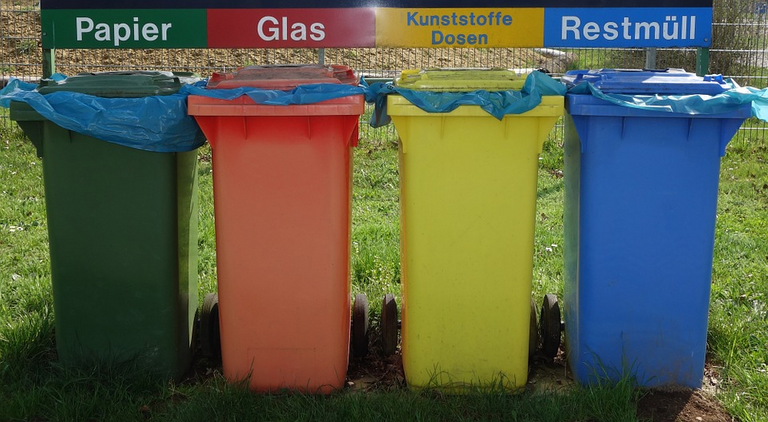Interesting Links: April 19, 2019
Business, News, Science, Technology, or whatever gets my attention.
Straight from my RSS feed:
Ten posts and micro-summaries from my 1000+ daily headlines. I filter them so you don't have to.
- Robots That Can Sort Recycling - Recent changes in China's law mean that more of America's recycling is winding up in American landfills. Current sorting processes mostly involve human workers and can be unsafe. The robot described here is intended to automate the process, which is a very difficult programming challenge. The machine is still under development and operates by using right and left handed grabbers that twist an object and measure changes in length and pressure to recognize the type of material.
- Machines Like Me -- A Talk By Ian McEwan [4.16.19] - Ian McEwan creates a speculative story about what it would be like to live aside an entity that humans had created with artificial intelligence and that believed itself to be "conscious". The story is set in an alternate reality, with a fictional 70 year-old Alan Turing as a principle character, and explores the difficulties that an AI would have in navigating the ambiguities of human notions morality. The talk is followed by a Q&A, but the sound gets weak at that point, so I stopped listening.
- How Managers Can Stifle Creativity - Harvard Business School interviews Professor Teresa M. Amabile about creativity. The discussion covers internal and external factors that can enhance or stifle creativity. Amabile notes that managers mostly influence the external factors, and that it's more natural for a manager to stifle creativity than to enhance it. In particular, a non-conducive work environment can undermine creativity by smothering an employee's intrinsic motivation, which is the enjoyment, satisfaction, or sense of challenge that a person gets from completing a task.
- PLOS ONE pulls highly cited mindfulness paper over undeclared ties, other concerns - The 2015 paper, Standardised mindfulness-based interventions in healthcare: An overview of systematic reviews and meta-analyses of RCTs, has been cited 130 times. The authors are from Erasmus Medical Cente, Harvard University, and Massachusetts General Hospital. The paper was pulled after a 2 year investigation, triggered when concerns were raised by James Coyne, Professor Emeritus at the University of Penn. The authors disagree with the retraction.
- How Twitter needs to change - TED curators talk with Twitter CEO, Jack Dorsey. Dorsey acknowledges that "right now it's super easy to harrass", but reports that they are attempting to change that by analyzing the platform's incentives, adding machine learning, and attempting to improve empathy by ensuring that the company's employee diversity matches its user base. They are also working to measure the "health" of conversations, including indicators like shared attention (staying on topic), civility, shared reality, and variety of perspectives, with the goal of eventually balancing them.
- Scientists have restored circulation to severed pig brains in a step that blurs the definition of death - A team of scientists has kept brain cells alive by circulating blood through a brain for a few hours after death. There was no sign, however, of organized signaling between the neurons. This technique may, eventually, have implications on when people are declared dead, they could become candidates for "brain resuscitation" instead of organ donation.
- Liquid Blood Extracted From 42,000-Year-Old Foal Found Frozen in Siberia - The 42,000 year old foal was embedded in permafrost and discovered by scientists last year. They have now extracted liquid blood from it with hopes of collecting viable cells to clone the extinct horse species. Semyon Grigoryev, head of the Mammoth Museum in Yakutsk said that it's the best preserved ice age animal that has ever been discovered. The Russian team is also trying to clone a wooly mammoth.
- Watch Now: Einstein’s Scientific Revolution and the Limits of Quantum Theory - Cosmologist and quantum theorist, Lee Smolin, gives a talk for the Perimeter Institute for Theoretical Physics in Ontario. (You can skip forward 15 minutes in the video, and the talk is about an hour long.)
- STEEM - @derangedvisions describes how to get an EOS wallet and start contributing to BOID, an app that pays cryptocurrency tokens in exchange for CPU time and other contributions.
- Why Everyone Values Freedom - Matt McManus, professor from Tec de Monterrey and book-author, including What is Post-Modern Conservatism? and Ben Burgis, the author of Give Them An Argument: Logic for the Left explain two views of freedom. According to them, the right views freedom from the Ancient Greek perspective that was also adopted by Locke, De Tocqueville, and others, as freedom from interference, and seeks to balance that value with others like tradition, stability, and social cohesion. Alternatively, from Marx onward, the left draws on ancient Roman philosophy, viewing freedom as "non-domination". In this understanding, government enhances freedom when it provides people with choices.
### About this series
Note: Sharing a link does not imply endorsement or agreement, and I receive no incentives for sharing from any of the content producers.
Thanks to SteemRSS from @philipkoon, @doriitamar, and @torrey.blog for the Steem RSS feeds!
In order to help make Steem the go to place for timely information on diverse topics, I invite you to discuss any of these links in the comments, and/or your own response post.
If you're not on Steem yet, you can follow this account in RSS.
0
0
0.000
0 comments
